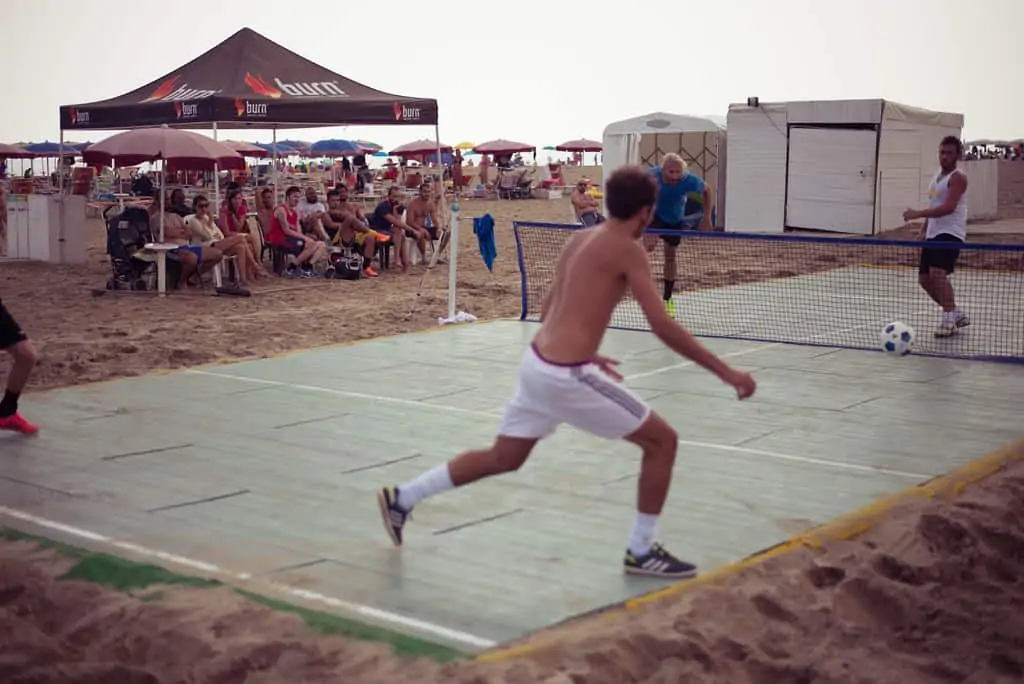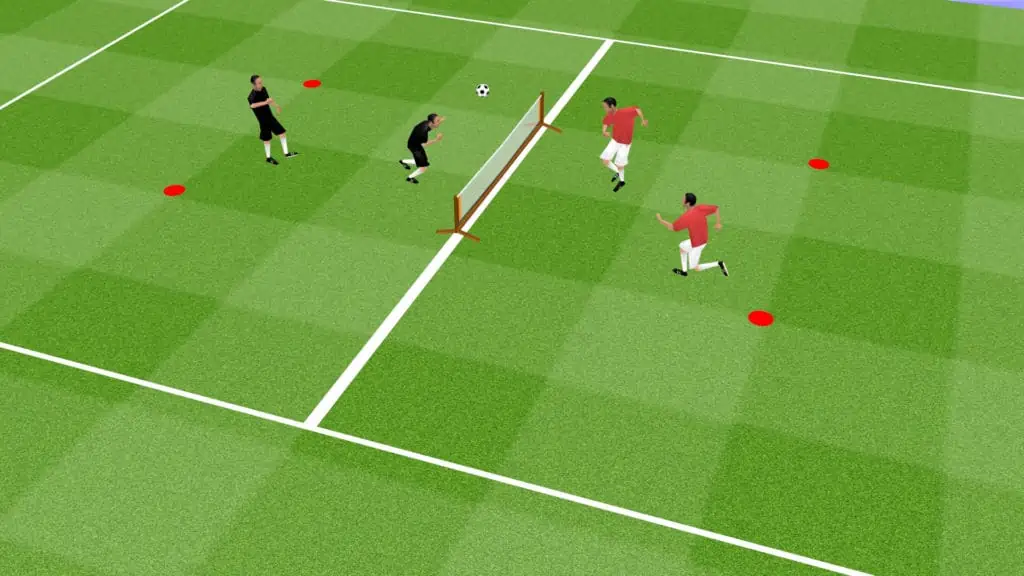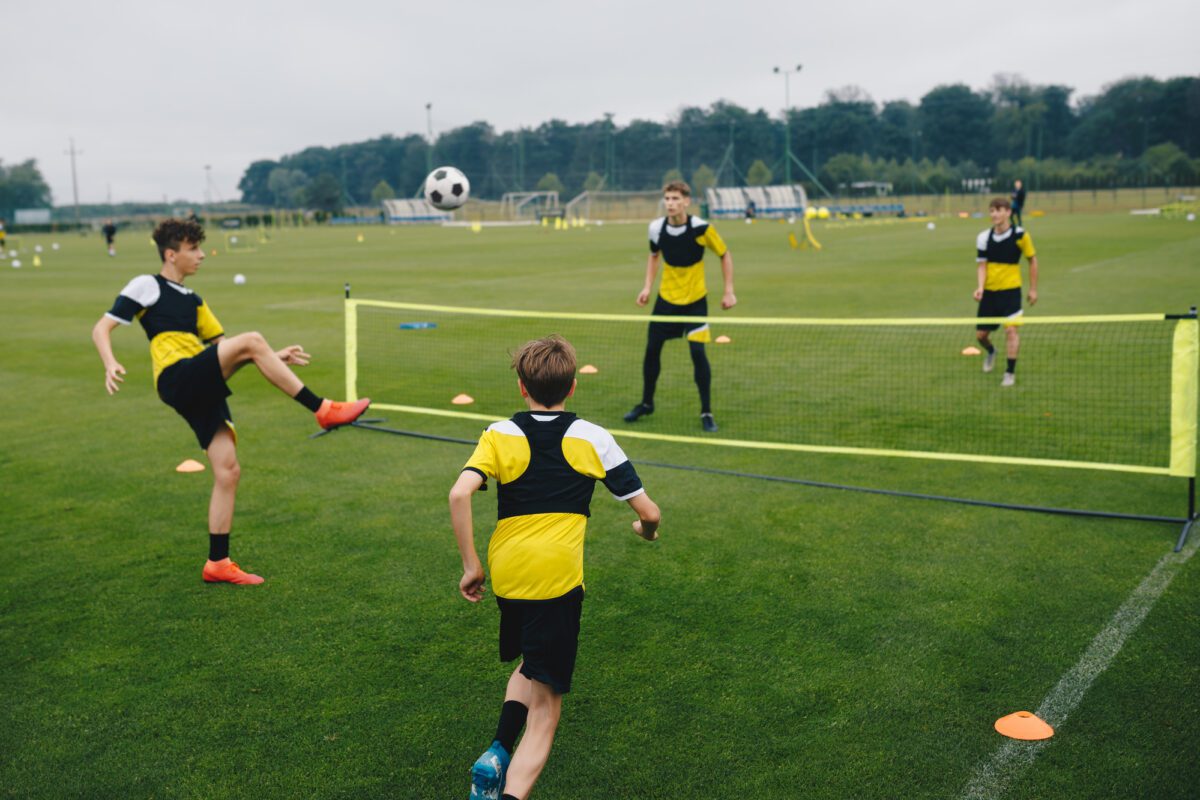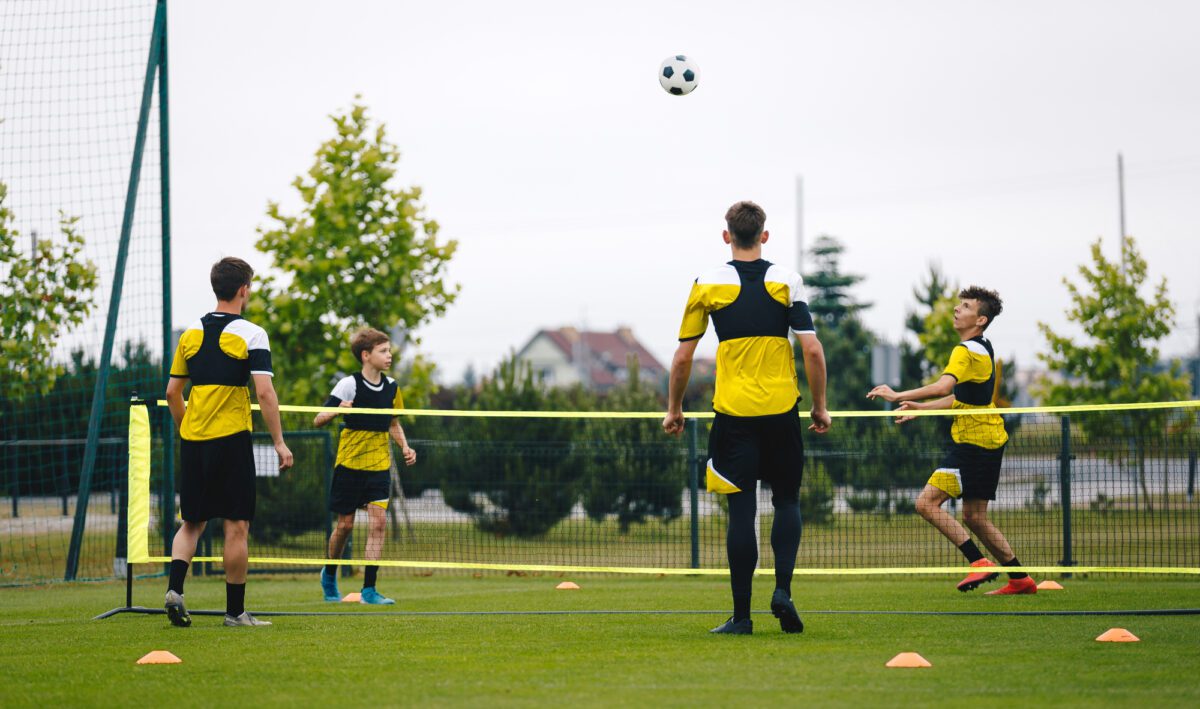Share the post "Soccer Tennis (History, Rules, and Drills)"
Soccer coaches and players are always looking for fresh and exciting ways to enhance skillsets and improve technique. Although repetition and drilling are key, it’s often beneficial to break the cycle and explore new avenues to apply specific techniques in different scenarios.
Soccer tennis is a fun game that not only breaks the monotony of standard soccer training but also improves essential techniques and skills, such as first-time passing, heading, knees, volleys, and chest control.
Let’s take a more detailed look at soccer tennis, exploring different aspects of the game, such as:
- When it was invented
- The rules of soccer tennis
- How to play soccer tennis
- What you need to play soccer tennis
Who would make the best soccer tennis player from today’s game?

What Is Soccer Tennis?
Soccer tennis, also called “footballtennis” or “futnet”, is a game that takes inspiration from soccer. It’s played with a soccer ball on a two-sided court divided by a short net. Soccer tennis can be played indoors or outdoors.
For maximum enjoyment and freedom of movement, it’s best to play soccer tennis on soft ground such as grass.
If they are athletic enough, players often attempt overhead, and scissors kicks in soccer tennis, so softer ground is preferable to minimize the risk of injury.
The main aim of the game is to score points against the opposing team.
Each player or team can allow the ball to bounce in their half of the court once before returning it over the net and within the boundaries of the court to the opposite side.
Failing to return the ball results in a point or goal being awarded to the opponent. Essentially, the scoring method is the same as tennis.
However, the key difference is that when striking the ball, you can use all body parts, other than the hands and arms, just like in soccer.
Ultimately, you’re trading a tennis court for a soccer tennis court, a tennis ball for a soccer ball, and a racket for a body (aside from the arms).

Is Soccer Tennis a Real Sport?
The International Footballtennis Association (IFTA) was established in 1987 as a governing body for the sport. It later changed its name to the Federation International de Footballtennis Association (FIFTA).
Soccer tennis is a real sport that is officially governed and regulated.
In 2010, representatives of soccer tennis founded the European Futnet Association (EFTA) as they felt FIFTA was not making progress with the sport.
However, since 2010, soccer tennis has been governed, regulated, and promoted by Union Internationale de Futnet (UNIF), which consists of various FIFTA and EFTA members.
The primary mission of UNIF is:
“To promote futnet worldwide and encourage the practice of men’s and women’s futnet in all its forms and all age groups; ensure that futnet is practised following the principle of non-discrimination…prepare and organise international futnet competitions”
UNIF, 2021.
Today, UNIF cites 28 members from all 5 continents.
UNIF Members
- Australia
- Austria
- Basques (ethnic group located primarily along the border of Spain and France)
- Benin
- Cameroon
- Canada
- Colombia
- Costa Rica
- Czech Republic
- Denmark
- England
- France
- Hungary
- India
- Iraq
- Ireland
- Italy
- Mali
- Poland
- Romania
- Slovakia
- South Africa
- South Korea
- Spain
- Switzerland
- Tunisia
- Ukraine
- United States
Even though it’s a genuine sport, amateur and professional soccer players often play futnet using their interpretation of the rules. Many soccer players may be unaware that it’s an official sport with a regulatory body.

When Was Soccer Tennis Created?
Soccer tennis was created in 1922 in the Czech Republic.
Who Invented Soccer Tennis?
The invention of soccer tennis is accredited to members of the Czech soccer team, Slavia Prague.
They initially began playing by kicking a ball back and forth over a rope that was horizontally suspended between two posts. As they experimented further, the rope was eventually replaced with a net.
In the early days, the rules of the game were constantly developing. A contest was typically played between teams of two or three players. Each team was allowed to touch the ball three times to send it back over the net.
The three touches were to be shared among the team, as anyone player was not allowed to take consecutive touches.
As the game was played by soccer players, they were only allowed to kick the ball using legal soccer techniques. Touching the ball with the hands and arms was not allowed.
Over the years, news of the game spread, and it became more and more popular within the Czech Republic. Other soccer franchises began to implement it as part of their training schedule.
The game also became a favorite pastime for young soccer players and in local neighborhoods.
The First Official Rules
The first official rules of the sport were created in 1940, and the game would be known formally as “futnet”.
Under the official ruleset, futnet can be contested 1 vs 1 in singles play, 2 vs 2 in doubles play, and 3 vs 3 in triples play.
Soccer Tennis Tournaments
While there were several local futnet cups and leagues played each year from that point on, futnet wasn’t recognized as an official sport in the Czech Republic until 1961.
Since becoming an official sport in the Czech Republic, futnet would eventually spread to other countries in Europe.
The inaugural Eurpean Championships took place in 1991, followed by the World Championships in 1994.
Let’s take a look at the Futnet World Championship winners since 1994:
| Year | Singles Champion | Doubles Champion | Triples Champion |
| 1994 | Hungary | Czech Republic | Slovakia |
| 1996 | Romania | Slovakia | Czech Republic |
| 1998 | Slovakia | Czech Republic | Czech Republic |
| 2000 | Czech Republic | Slovakia | Slovakia |
| 2002 | Czech Republic | Czech Republic | Slovakia |
| 2004 | Slovakia | Czech Republic | Slovakia |
| 2006 | Romania | Slovakia | Slovakia |
| 2008 | Romania | Czech Republic | Slovakia |
| 2010 | Romania | Romania | Hungary |
| 2012 | Slovakia | Slovakia | Slovakia |
| 2018 | Czech Republic | Czech Republic | Czech Republic |
As an amateur sport, futnet doesn’t get much mainstream coverage from sports broadcasters or news corporations.
The official record-keeping for tournaments is also quite limited, and tournaments after 2018 have been postponed due to the global pandemic.
Here is some footage of the 2018 World Championships: a triples game between the Czech Republic and Poland.
What Are The Rules For Soccer Tennis?
In the official rules, soccer tennis can be played in one of three ways:
- Singles
- Doubles
- Triples
Depending on the number of players, the rules vary slightly.
As discussed earlier, the main objective is to score points by bouncing an unreturnable shot into your opponent’s half of the court using any part of the body other than the hands and arms.
While the ball can skim the net on the way over, if it returns to the kicker’s side, they may not strike it again. If a player touches the net, a point is awarded to the other team.
Now, let’s take a more detailed look at the rules in each discipline:
Singles (1 v 1)
- Court Size: 29.5 feet wide x 42 feet long
- Net Height: 3.6 feet high
- Number of Touches Per Play: 2
- Number of Bounces Per Play: 1
Doubles (2 v 2)
- Court Size: 29.5 feet wide x 42 feet long
- Net Height: 3.6 feet high
- Number of Touches Per Play: 3 (limited to single, consecutive touches per player)
- Number of Bounces Per Play: 1 for men, 2 for women, and juniors
Triples (3 v 3)
- Court Size: 29.5 feet wide x 59 feet long
- Net Height: 3.6 feet high
- Number of Touches Per Play: 3 (limited to single consecutive touches per player)
- Number of Bounces Per Play: 1 for men, 2 for women and juniors
In all disciplines, games are played in sets.
Each set is won when one team reaches 11 points. However, you must win by 2 clear points, meaning the set can go past the 11 point mark.
If one team reaches 15 points, they win the set, regardless of the points difference.
Therefore, the maximum score in a game is 15:14.
To win a match outright, a team must win 2 sets.

How Do You Serve In Soccer Tennis?
Players serve by kicking or striking the ball with any part of the body other than the arm and hand.
A service takes place from behind the baseline, outside of the court.
The ball must travel over the net (it’s allowed to touch on the way) and touch either the opposition’s half of the court or an opposition player.
Like in tennis, a double fault results in a point being awarded to the other team.
The team that scores a point always carries out the next serve.
How Do You Play Football Tennis?
To play soccer tennis properly, you’ll need some equipment. However, it’s always possible to adopt a homemade approach to the game. Take “jumpers for goalposts” as inspiration, and use your imagination if you don’t have a court or net.
Soccer Tennis Net
A regulation soccer tennis net is a cross between a soccer goal net and a tennis net. It should span the width of the court and stand 3.6 feet high.
In official games, the net is suspended between two round poles made from metal or plastic. These ensure that the net has the necessary tension. The distance between the bottom of the net and the ground should be no more than 7.8 inches.
For non-official games, players don’t have to be so precise with the measurements of the net.
Check out this portable soccer tennis net, suitable for indoor and outdoor games.
Soccer Tennis Ball
A soccer tennis ball is essentially the same as a regular soccer ball but it must comprise 32 synthetic leather panels.
According to the official “UNIF FutNet Laws of the Game“, a regulation ball should be as follows:
- Glued with 32 panels
- Black and white in color
- Made from synthetic leather
- Weigh between 396 and 453 grams
- Have a circumference between 680 and 710 mm
- Have a height rebound of 660 and 720 mm
- Be inflated between 60 and 65 kPa
Outside of official games, standard soccer balls work perfectly.
The MLS 2021/22 Adidas Pro Ball is an excellent all-rounder that can double your soccer tennis ball as well as your game-day ball.
Where to play soccer tennis
Apart from the net and the ball, you only need a suitable space to play.
Although regulated soccer tennis courts are pretty big, it’s possible to play in confined spaces.
If you ever watch professional soccer players playing soccer tennis, they typically play within tight boundaries. With less space, they must be more controlled with their touches, prioritizing skill overpower.
Check out Bayern Munich players taking part in soccer tennis games during training.
Soccer Tennis Without a Net
The sport of soccer tennis was first played with no net so you can easily play without one too.
Use a bench or miniature goalpost to create a height barrier.
Alternatively, you can play without any height restrictions. Just create a line that divides the court instead. You’ll find that soccer tennis is still a challenge without a net.
Soccer Tennis Drills
Soccer tennis is a drill in itself, particularly for those who’ve never played it before.
Some variations of the game include;
- One touch
- Two touch
- Right foot only
- left foot only
- Headers
- Each player needs to touch the ball
While it may seem like a simple game and look easy to play, it’s quite the opposite. It requires excellent first-touch control with various body parts and accuracy and precision. Players must constantly be on their toes, ready to react.
If you’re considering introducing soccer tennis drills to your regular training routine, consider playing a mixture of singles, doubles, and triples. At first, allow two bounces, and two consecutive touches per player, with unlimited team touches.
Once players have become accustomed to the style of play and are improving their soccer tennis skillset, only allow one bounce and one touch per player.
Another fun idea is to reduce the size of the playing area and allow only headers or volleys.
See our free soccer drills for more details on how to play soccer tennis.
Share the post "Soccer Tennis (History, Rules, and Drills)"
Joel is a seasoned soccer journalist and analyst with many years of experience in the field. Joel specializes in game analysis, player profiles, transfer news, and has a keen eye for the tactical nuances of the game. He played at various levels in the game and coached teams - he is happy to share his insight with you.



